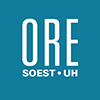ORE offers a graduate program leading to the Master of Science (MS) and Doctor of Philosophy (PhD) degrees. The goal of the program is to prepare students for the engineering profession and to conduct research in support of education. These objectives, along with the curriculum described below, were developed in collaboration with ORE’s advisory panel.
The program educational objectives of the MS program are to produce graduates who, within a few years of graduation:
- Are able to handle multidisciplinary problems by assimilating relevant information and applying mathematics, science, and engineering principles;
- Are proficient engineers translating client’s requirements and technical needs into solvable tasks and synthesizing solutions into actionable recommendations or engineering designs;
- Have broad understanding of the ocean and resources engineering disciplines as well as the changing needs and technologies in the industry;
- Are highly proficient and ready to assume responsibility on tasks related to one or more of the ocean and resources engineering disciplines;
- Are able to make proper judgment related to professional, ethical, managerial, economic, and other non-technical issues commonly encountered in engineering practice; and
- Can communicate in written and verbal form and work effectively with peers, clients, and the public in conveying new ideas, products, or designs.
The program at the PhD level shares the program educational objectives of the MS program, with the added emphasis on producing graduates who:
- Can conduct original research and develop new technologies in ocean and resources engineering; and
- Have the experience to publish in refereed journals.
This additional emphasis prepares our doctoral graduates to pursue research careers in industry and academia.
Since the Department of Ocean and Resources Engineering only offers graduate programs, a concomitant goal is to conduct research in support of education. The strong PhD program and the culturally diversified PhD student body expose the MS students to the latest research and development in an international setting.
Student Outcomes include:
- Working knowledge of fundamental mathematics, science, and engineering principles that include statics, dynamics, fluid mechanics, solid mechanics, and probability and statistics
- Proficiency in the core program of Ocean and Resources Engineering that comprises hydrostatics, oceanography, water waves, underwater acoustics, ocean instrumentation, and laboratory and field experience
- Mastery of at least one of the four Ocean and Resources Engineering disciplines that include coastal, offshore, ocean resources, and oceanographic engineering
- An ability to identify, formulate, and solve complex ocean and resources engineering problems by applying principles of engineering, science, and mathematics
- An ability to apply engineering design to produce solutions that meet specified needs with consideration of public health, safety, and welfare, as well as global, cultural, social, environmental, and economic factors
- An ability to communicate rationale, methodologies, and recommendations of projects effectively in written and verbal form with a range of audiences
- An ability to recognize ethical and professional responsibilities in engineering situations and make informed judgments, which must consider the impact of engineering solutions in global, economic, environmental, and societal contexts
- An ability to function effectively on a team whose members together provide leadership, create a collaborative and inclusive environment, establish goals, plan tasks, and meet objectives
- An ability to develop and conduct research through appropriate experimentation, analyze and interpret data, and use engineering judgment to draw conclusions,
- An ability to acquire and apply new knowledge as needed, using appropriate learning strategies, and
- Meeting of educational goals through a customized program of study, training, and research
